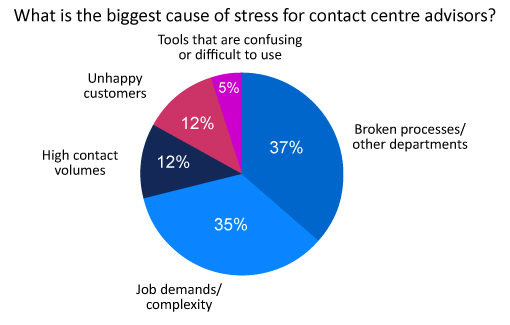In the next part of our Contact Centre Manifesto series, we explain how to create and maintain a positive culture in a challenging contact centre environment.
The problem
It is extremely difficult to create and maintain a positive culture in a contact centre environment for 3 main reasons:
1. Few people aspire to work in a contact centre
Few people walk into a role as a frontline agent following a dream to one day be a contact centre manager.
The reality is that most people end up in a contact centre role as a necessity, a stop-gap job to pay the bills while they wait for their “big opportunity” to arrive.
This can result in a negative environment filled with people feeling trapped in a life they didn’t want for themselves, a feeling which can worsen as time passes and their “dreams” fail to materialise.
2. The role of a frontline agent is increasingly challenging
The uptake of self-service and automation has removed a lot of the simple, repetitive tasks from the frontline. This has given way to an increase in complex queries, requiring more skills, patience and knowledge.
Contact centres have also added more channels and more sophisticated technology into the mix – making the job far more challenging than it was 10 years ago.
3. Customers are more demanding and expect a bespoke service
Customers’ expectations have also changed. The majority of customers now expect fast, bespoke service – and if they don’t get it, the world will certainly hear about it on Twitter!
This shift in customer demand – and increased risk of serious, public repercussions – has added more pressure to the frontline, as they strive to represent their brand and deliver an exceptional customer experience on every interaction.
What can we do about this?
Step 1: Get the basics right

Try to make sure there is nothing to be unhappy about in the first place
Creating a positive working environment isn’t just about handing out sweets on the contact centre floor; it’s about getting the basics right so there’s nothing to be unhappy about in the first place.
Offer competitive salaries and engage agents in fair bonus schemes
It can be very demoralising to know that the person across the road doing the exact same job as you is being paid a lot more. Nip any complaints in the bud by keeping your salaries competitive.
It is also important to make sure any bonus schemes are fair and achievable. Adding a target-driven bonus scheme can be a great boost for morale, but agents will quickly become jaded if the targets are set impossibly high.
Get every week off to a great start with “Tidy and Check Monday”
Get every week off to a good start by making sure everyone has a clean desk and all the equipment they need to hit the ground running on a Monday morning.
In a “Tidy and Check Monday” session, everyone is given a pinny, a Dettol wipe and a list to write down any problems for the IT team to handle.
Tidying out the fridge every Friday and asking agents to wash up after themselves in the breakout room can also help to instil a sense of pride in the workplace.
Choose a dress code that instils a sense of pride in the workplace
For a lot of young people, working in a contact centre is their first job. Teaching young people life skills and respect for where they work is important, and having an appropriate dress code can help you achieve this.
Subsidise canteen options and organise special employee discounts
Subsidise canteen options where you can. Also start conversations with local businesses to see if they would be willing to offer special discounts to your employees.
All agents will appreciate initiatives that make their salaries stretch that bit further.
You can also improve your canteen by giving it a fun makeover. Read our article Creative Ideas for Call Centre Office Design for inspiration.
Take steps to improve interdepartmental relationships
In a recent Call Centre Helper webinar poll, we asked “What is the biggest cause of stress for contact centre advisors?”
The results showed that broken processes and other departments were a key cause of stress for agents. If this is true in your contact centre, you may need to take steps to improve interdepartmental relationships.
Here are some ideas we picked up from Tesco Bank Insurance and their experience of overhauling their complaints procedure (through improved interdepartmental relationships):
- Nominate “complaint buddies” to help departments communicate
- Hold individuals accountable for escalating calls
- Ease the pressure by setting realistic expectations for your customers
- Tie key metrics together across different departments
Click here for more information in our 21 Ways to Improve Complaints Handling in Your Contact Centre article
Fix your broken processes
Many calls coming into the contact centre are the end result of broken processes and systems in the wider business.
Agents can be trained on how to handle unhappy customers. But if your agents are having to deal with these calls (about the same issues!) day in, day out, they will likely become emotionally exhausted.
Regularly reviewing your processes and talking to your agents about developing trends in customer complaints can help address any problems at their root cause – and reduce the volume of unhappy calls coming into the contact centre.
Protect your agents from the stress of the head office
It is a contact centre manager’s job to protect their team from the stress and targets that come down from head office.
Feed information to the frontline on a need-to-know basis, and give them the space they need to focus on the customer. If you bombard them with stress and negativity, they will quickly start looking for another job.
Agents need to understand their purpose in the wider organisation
A sense of purpose sits alongside engagement and satisfaction in underpinning a positive workplace culture.
While they don’t need to be exposed to every detail and target (which could cause unnecessary stress), agents should have a firm understanding of the company’s vision and how their role feeds into it.
This can be introduced in the induction phase and regularly discussed in one-to-ones and team meetings.
Step 2: Talk to your frontline agents and listen to their needs

Talk to your agents about their experience in the contact centre
You can also address core issues by talking to your agents about their experience in your contact centre, including:
- Problems they regularly encounter with customers or shift patterns
- Where they want to be in the future and the transferable skills they can build in the contact centre
- How the tools they use help (or hinder) their ability to fulfil their job role
Ask questions and listen to what your frontline agents REALLY have to say
Make a conscious effort to ask questions and listen to what your agents have to say. Don’t just put words in their mouth.
If you are struggling with buy-in, it can help to hold smaller focus groups with 5–6 agents. This will create an opportunity for a more in-depth discussion, as well as give the team a chance to get to know their team leader or manager better.
You can show your agents that you are really listening to them by following up any discussions with a “you said, we did” session later on.
Involve a variety of agents in your decision-making processes
If you are trying to gather agent input for a new initiative, choose a diverse group of agents to talk things through – from your very best and longest-serving, to your average performers, and newest, and even laziest agents.
This will help you to see how a new initiative would impact everyone in your team, from a variety of perspectives.
Help agents develop their transferable skills
If you don’t have any internal opportunities for your top-performing agents, ask them where are they planning to go next.
Helping them to understand how their role relates to where they see themselves in the future, and giving them additional tasks to help support their wider skill sets, can help to keep them happier (and retain them) for longer.
For example, if an agent tells you that they are currently studying to become a teacher, give them some time off the phones to help support the coaching and training team.
Don’t force progression onto someone just because you think they are ready
Pushing someone into a team leader role just because they’ve been working in your contact centre for a long time isn’t always the right decision.
Make time in your one-to-one sessions to talk to your agents about what’s important to them, and whether they actually want the increase in responsibility.
Everyone has different motivations for coming to work – and making the wrong assumptions could cost you your best agents.
Case Study: OVO Energy
We also spoke to OVO Energy in Bristol about how to create and maintain a positive culture in the contact centre.
Here are some ideas we picked up:
Invest in non-linear career progression
Create a broader range of progression opportunities for agents by moving away from linear progression (e.g. Agent – Team Leader – Floor Manager), and instead investing in non-linear career paths.
For example, financially rewarding agents who want to become experts in a chosen subject area or who want to move across into the coaching team.
This should help you to improve retention rates and make the best use of the talent already in your business.
…And host regular “graduation ceremonies” to celebrate progression
Any employee who has taken the initiative to progress within the company deserves to be formally recognised.
Host regular graduation ceremonies to celebrate those who have advanced their skill set (e.g. single-skilled to multi-skilled) or have been promoted.

Engage agents in development opportunities beyond their core role
The University of OVO gives all employees the opportunity to broaden their knowledge outside of their core role, by allocating everyone with 4 days a year to spend on attending different training courses. This is separate from core training.
You could also try organising your own TED Talks to give your employees the opportunity to learn about other areas of the business from various heads of departments.
Display customer feedback and agent praise in Reception for everyone to see
Don’t just display customer feedback and agent praise on the contact centre floor. Also put it on wallboards in your reception area for everyone to see.
This will help agents feel that their achievements are being recognised across the business, as well as act as a positive welcome to any visitors.
Non-edible prizes have a longer-lasting effect for the same budget
Sweets and chocolates can be a fun and relatively cheap way to say thank you to your agents, but the impact is short-lived.
Instead, give out non-edible prizes such as small trophies that can sit on agents’ desks in the weeks following the initial recognition.
For more inspiration from OVO Energy on how to make your contact centre a great place to work, read our article 14 Ideas We Learnt at OVO Energy’s Contact Centre
Step 3: Don’t be afraid to have fun
Be creative when you have dips in call volumes
In an unexpected dip in call volume, it is easy for morale to plummet. If you spot agents looking bored as they wait for their next call, think of something different for them to do.

Jennie Corner
“One day when it was a bit quiet on the phones, I noticed that some agents had taken to colouring in between calls,” said Jennie Corner, Operations Manager at Assurant Solutions. “They looked bored and in need of a “pick me up”, so we went for a run round the building! Taking full advantage of these golden moments is really important for morale.”
It can also help to have a structured plan in place for when call volumes are low. For example, one-to-ones, e-learning modules, impromptu coaching, or allow agents to spend some time sharing and teaching each other skills.
It isn’t possible to fill every second, however, and sometimes it should be OK for agents to “just do a Sudoku”.
Live on-the-spot feedback can be both fun and useful
Call listening is a great way to pick up on any weaknesses in an agent’s call handling technique, but feedback can quickly become irrelevant if left to a monthly review.
Instead, listen in on live calls and invite agents into your office immediately after an amazing call for on-the-spot praise. This can make help a repetitive job quite fun for the call listener, as well as put a spring in an agent’s step for a job well done.
Play music in the breakout room every Friday

A fun way to liven up Fridays in the contact centre (and reduce absence) is to play music in the breakout room.
The playlist or theme can be chosen by a nominated person each week, and this should help everyone get into “that Friday feeling”.
Give your training sessions a themed makeover like “Space Camp”
Training sessions can be dull, but they don’t have to be.
One way to liven things up and engage your frontline in the necessary learning material is to give each training session a theme.
For example, a “Space Camp” theme could include a mission to “eliminate unhappy customers from the planet”, themed music, and props.
Put a “positive pot” on the contact centre floor to encourage congratulations
To help encourage your frontline to celebrate each other’s achievements, place a “positive pot” on the contact centre floor.
If an agent spots a member of their team doing something wonderful for either a customer or a colleague, they can write down a message of congratulations and pop it into the positive pot.
These comments can then all be read out on a Friday afternoon, celebrating the best moments of the week.
Step 4: Appoint a Colleague Experience Manager
Leading contact centres such as Lloyds Bank, Tesco and OVO Energy now have Colleague Experience Managers.
What is a Colleague Experience Manager?
A Colleague Experience Manager is responsible for the complete, end-to-end employee experience. Their role is to ensure that key issues impacting employee engagement and attrition don’t fall by the wayside of other departments.
They are involved at every level of the employee experience. This extends to recruitment and exit interviews, as well as maintaining a positive working environment on a day-to-day basis.
Their focus is on understanding what the organisation does well and what could be done better. Most importantly, they take responsibility for the employee experience and act as a key driving force in actioning any changes across the organisation.
For more information, read our article Does Your Contact Centre Need a “Colleague Experience Manager”?
Additional ideas from our readers
Here are some other ideas our readers have tried to help drive a positive culture in the contact centre:
Workplace massages once a month

We’ve started to give our agents workplace massages once a month, which have gone down really well.
Focusing on agent health and well-being is an important factor when trying to achieve a positive culture.
With thanks to Hannah
Team managers need to filter out disengaging messages from the head office
I try hard to filter all the negative messages from head office that are disengaging. It’s often a hard struggle.
People innately want to do a good job, but sometimes we make it too hard for ourselves.
With thanks to Greg
Empower agents to use their own discretion during a call
Allow agents to use their own discretion during a call. Even if they make a minor mistake, they will learn from it.
We need people, not robots, dealing with our customers!
With thanks to Michael
Organise social events that involve different teams
Organise events outside of work that incorporate different teams – if not the whole company!
Good working relationships across the business help the contact centre to succeed.
With thanks to Holly
Engage agents in “special tasks” with the wider business
Give agents additional “special tasks” that are particularly useful for the wider business, and allow them to experience something beyond their everyday tasks.
This will encourage them to develop and support their professional growth within the company in future.
With thanks to Kathrine
Team managers should take calls daily alongside their team
I take calls daily alongside my team.
This keeps me in the loop with what my team members are experiencing on their calls.
With thanks to Brandy
A “What Matters” group helps agents to open up about key issues
We have started a “What Matters” group.
This allows our agents to be open and honest about what isn’t going well – and what could be done to improve it.
With thanks to Laura
Get agents involved in organising new employee initiatives
Encourage your agents to come up with new fun ideas for contests and themed events in the contact centre.
This will ensure buy-in and be recognised positively as bottom-up decision-making. This can also be applied to learning events.
With thanks to Michael
Tie social events in with fundraising
We tie in social events with fundraising.
This means that colleagues not only have a fun night out but know they are supporting local charities and good causes in the process.
With thanks to Hannah
This article forms part of The Contact Centre Manifesto series
With special thanks to OVO Energy in Bristol, Justin Robbins, Community Director at HDI & ICMI, and Jennie Corner, Operations Manager at Assurant Solutions
Author: Megan Jones
Published On: 22nd Jun 2016 - Last modified: 30th Sep 2022
Read more about - Customer Service Strategy, Contact Centre Manifesto, Culture, Editor's Picks, Employee Engagement, Fun, Morale

















